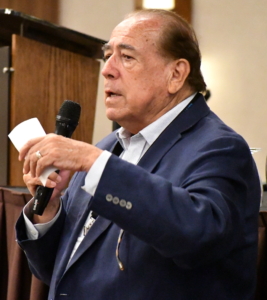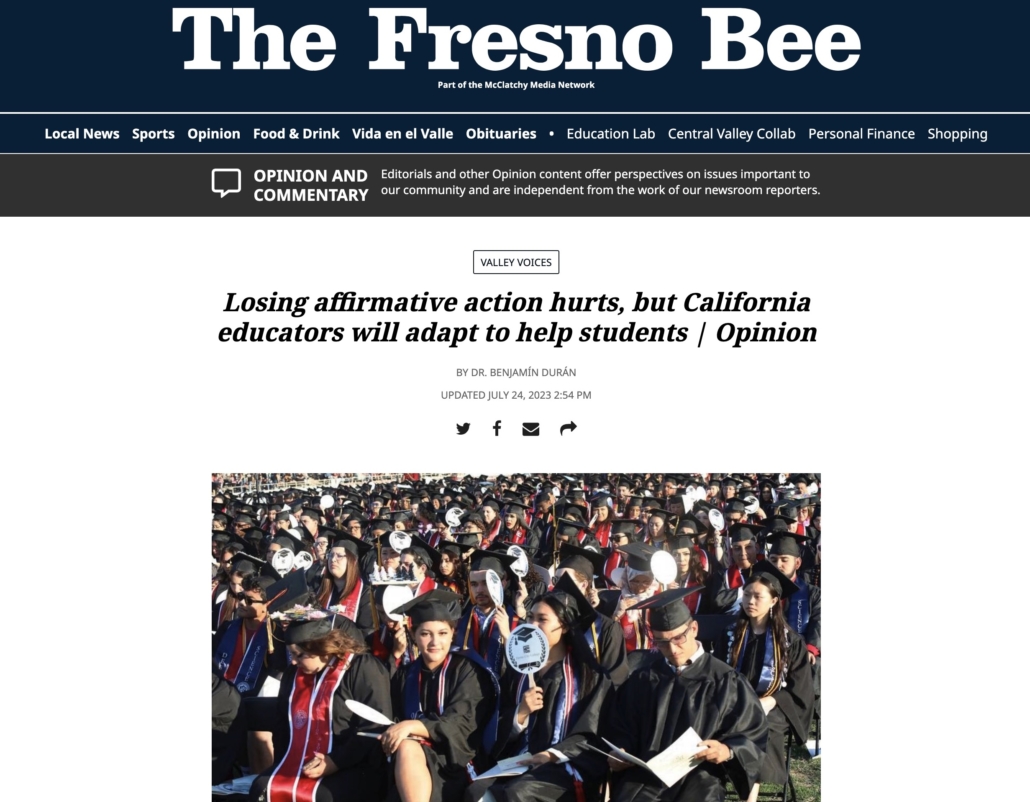CVHEC IN THE NEWS: Affirmative Action OpEd (Fresno Bee)
Following the historic Supreme Court June 29 decision that severely limited, if not effectively ended, the use of affirmative action in college admissions, Central Valley Higher Education Consortium Executive Director Benjamín Durán, wrote of his reaction and that of many colleagues, family and friends in his Director’s Message for the CVHEC summer newsletter edition. Dr. Durán’s message also was published in this Valley Voices column of The Fresno Bee Opinion section. (By a vote of 6-3, the justices ruled that the admissions programs used by the University of North Carolina and Harvard College violate the Constitution’s equal protection clause, which bars racial discrimination by government entities).
VALLEY VOICES | Opinion
Losing affirmative action hurts, but
California educators will adapt to help students
BY DR. BENJAMÍN DURÁN
(Published in The Fresno Bee Op-Ed Section • July 24, 2023)
When the much anticipated but still devastating decision by the U.S. Supreme Court to strike down affirmative action burst onto the national scene June 29, my phone went into non-stop notifications from family and higher-ed colleagues beset with disappointment and anger.
And, as the country was reeling from that monumental decision, SCOTUS took further action to declare unconstitutional President Biden’s efforts to bring some relief to those holding student loans.
In one week — after decades of progress — equity, diversity and access in higher education were simultaneously under attack.

Dr. Benjamín Durán is executive director of the Central Valley Higher Education Consortium and president-emeritus of Merced College.
However, I offer that this Supreme Court ruling is not the death of affirmative action, but rather a challenge to renew and reinforce its spirit and outcomes.
Upon hearing the news and fielding those phone calls, I thought back to 1996, when California voters passed Proposition 209, effectively ending affirmative action in California; and even back to the University of California vs. Bakke case in 1976. Having spent decades in higher education, first as a student and mostly as a professional educator, I reflected on and contemplated how California dealt with those landmark decisions.
I recalled that, despite the initial impacts from those decisions that have cost countless students of color the chance to earn a higher education, advocates and colleagues here in California have nonetheless long embraced the quest for equity in pursuit of student populations that reflect the rich diversity of our state despite legislation and court action to the contrary.
Following that elimination of affirmative action in California 27 years ago, educators in all four segments of higher education — the University of California, the California State University System, the California Community College System and the Independent Colleges and Universities — initiated new strategies and initiatives to attract and enroll students from underrepresented groups that had been targeted by Proposition 209 and the Bakke case.
We made some gains in the face of anti-affirmative action adversity here in California, but there is still more work to do, especially as evidenced by these new Supreme Court rulings.
If we truly believe that “all” means all and “everybody” means everybody, it is appropriate that the impact of race, economic status and a person’s life experience are factors that should be considered as students pursue the dream and promise of higher education.
Today, now more than ever, the equity efforts long in play here in California are essential nationwide. We must not let up in our quest to strive and reach goals that have not yet been met but are being pursued relentlessly by countless higher education professionals, policy makers, legislators, students and community supporters throughout our state and in other states similarly affected.
Locally, the work of the Central Valley Higher Education Consortium members – made up of 28 colleges in the nine-county region from San Joaquin to Kern – under our equity umbrella aligns very well with reinforcing and renewing efforts to address the spirit and outcomes of Affirmative Action as it was intended when first conceptualized, not as it has been characterized lately.
I am confident that our Central Valley colleges and universities will continue to make their institutions open to all because it is the right thing to do, not because it is legislated.
So I invite and encourage my esteemed colleagues serving students throughout the Central Valley and beyond to once again rise to this new challenge, as we have always done, with a renewed vigor in continuing the good work you have done for our students.
Let us use the anger and disappointment we felt initially and get on with the work ahead of us. We must assure that the spirit of affirmative action, as it was originally intended, thrives for the good of our entire community. Dr. Benjamín Durán is executive director of the Central Valley Higher Education Consortium and president-emeritus of Merced College.
See the Fresno Bee op-ed





Leave a Reply
Want to join the discussion?Feel free to contribute!